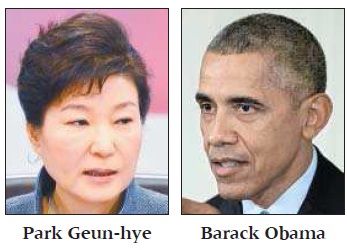President Park Geun-hye will address the nation tomorrow about North Korea’s latest nuclear test and South Korea’s response.
“Park will issue the address to the nation Wednesday morning [at 10:30 a.m.] and also answer some questions from the press in a media conference,” a Blue House official said Monday.
Park originally planned to unveil her vision for the fourth year of her presidency and hold a press conference before the Lunar New Year holiday on Feb. 8. She accelerated that plan to address the nation and hold a press conference tomorrow, the official said. The address to the nation will be Park’s fifth since she took office. She has issued special statements to make direct appeals to the people on important issues, such as an apology for the government’s botched response to the Sewol ferry’s sinking in her third statement in 2014.
The Blue House said Park canceled a routine senior secretariat meeting Monday morning to prepare for the address and press conference.
Park will be responding to North Korea’s fourth nuclear test on Jan. 6. The North claimed that it successfully tested a hydrogen bomb, although there has been no confirmation of that claim and plenty of skepticism.
Park is expected to stress Seoul’s determination to cooperate with the international community to impose stronger and more comprehensive sanctions on Pyongyang, her aides said. She will also likely condemn the Kim Jong-un regime’s so-called “two track” policy of pushing forward nuclear development and economic growth simultaneously.
In addition to the North Korea issue, other economic issues, particularly economy-related bills stalled at the National Assembly, are expected to be addressed.
Park’s message will be televised around the same time as the final State of the Union address by President Barack Obama in the United States. Obama is scheduled to speak at 9 p.m. on Jan. 12, 2016, in the House of Representatives Chamber in the U.S. Capitol building in Washington, D.C.
While the U.S. president did not mention North Korea in last year’s State of the Union address, expectations are high that he will this year.
White House Chief of Staff Denis McDonough warned Sunday that North Korea will remain an “outcast” unless it lives up to its previous commitments to denuclearize, including in an agreement reached at the six-party talks on Sept. 19, 2005, among South Korea, the United States, China, Japan and Russia.
In an interview with CNN, McDonough discussed the State of the Union address and North Korea. “What we’ll continue to do is work not just with South Korea and Japan but also with China and Russia to deeply isolate the North Koreans,” he said. “I’m not telling you that I think that this is ultimately going to get – that this is going to resolve this issue overnight. We’re going have to continue to squeeze the North Koreans until they live up to their prior commitments including going back to 2005, when they committed to be rid of their nuclear weapons,” he said. “That’s the baseline requirement: they have to rejoin the international community. Until they do it, they’ll remain where they are, which is an outcast – unable to provide for their own people.”
The Pentagon is planning to send more strategic weapons to the Korean Peninsula. A B-52 nuclear bomber was sent from Guam in a show of force on Sunday, and a plan to deploy the nuclear-powered aircraft carrier USS Ronald Reagan next month to waters near the peninsula is also being considered.
South Korean, U.S. and Japanese chief negotiators for the six-party talks will meet in Seoul on Wednesday. South Korean and Chinese chief negotiators will meet on Thursday.
The Ministry of Unification took a step Monday to tighten its control over the Kaesong Industrial Complex, the last remaining inter-Korean economic project.
According to the ministry, it ordered South Korean operators of the factories to send only a minimum number of workers to Kaesong starting Monday. Overnight stays in Kaesong by South Koreans will be prohibited.
Under the new measure, the number of South Koreans in Kaesong will go down from around 800 to 650.
“The North is expected to react to our decision to resume propaganda broadcasts [along the border], so we are reinforcing safety measures for our citizens,” said Jeong Joon-hee, spokesman of the Unification Ministry.
The military resumed propaganda broadcasts at the border Friday, ending 136 days of silence, to punish the North for the nuclear test. The broadcasts, a form of psychological warfare, were aired using loudspeakers at 11 frontline locations. They started as the North celebrated its leader Kim Jong-un’s birthday.
The ministry said no sign of abnormality was detected in Kaesong.
BY SER MYO-JA [ser.myoja@joongang.co.kr]





